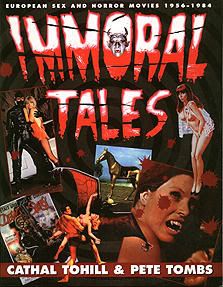
This weekend I was in Chicago to visit Annabelle and to do some research on a new project. For the project (which I'll talk about later), I spent part of the day on Saturday and Sunday at the Leather Archives & Museum in East Rogers Park looking at vintage erotica and learning about the history of the Chicago gay leather scene. I've already written almost a year ago about LA&M's exhibits on the history of the gay leather community in Chicago and their wonderful collection of books about BDSM -- I'm still looking for a private collection to equal it in New York.
Most of the erotica that I looked at at LA&M this weekend was the pulp variety from the 1960s. It always strikes me how very different old erotica is from today's variety. Today, erotica stories tend to be fairly realistic depictions of sexual encounters you could actually have. Not so in the pulp stories of the past. Those stories are full of fantastic and bizarre situations. They take place in exotic locales -- Europe, New Orleans and (the most debauched of all) New York. They're filled with immoral Oriental girls and insatiable mulattos who coerce their victims with razor blades. And despite the fact that these books were being labeled obscene and their writers, publishers and distributors persecuted for being moral degenerates, the stories are -- fascinatingly -- full of negative messages about sex. Promiscuous female characters are shamed as sluts and harlots. As surely as the sun rises, a woman who gets a taste of sex will fall into a spiral of depravity and degradation, homosexuals usually end up dead, and sadists are possessed of an uncontrollable bloodlust that inevitably leads to murder.
This echo of moral judgement is one of the most fascinating things about erotica of this period -- the very condemnation and sex-negativism that interfered with the sale of this kind of material is the source of most of most of its stories. It nearly qualifies as Stockholm Syndrome. The books ridicule and perpetuate harmful stereotypes about the very kind of people who presumably consumed them. Why do the authors and publishers decry and lament the conditions that allow them to make a living? Why do the readers of these appreciate such a thorough denunciation of perverts like them (or, at least, the type of pervert they would be if they could find the courage)? It is paradoxical, so say the least!
Another striking thing about these books is how many of them insist that the subject matter is true. Often this comes as a disclaimer on the cover or before the title page that goes something like this: "I wish I could tell you what you're about to read was fiction but, sadly, every horrible word of it is true." It then goes on to explain that the names, locations and other particulars of this true account have been changed to protect the identity of the characters from anyone who might try to fact-check the "true story."
Another variation on this theme is the so-called "documentary" book. These expose the "sordid" details of the underground sexual communities of the day -- homosexuals, sadomasochists, sex workers -- in a format that poses as either journalism or psychology. One suspects from the very unrealistic dialogue in the "interviews" that the material in most of these books is made up wholesale, but some of the most famous ones are probably actual reportage. These books are so fascinating because they both condemn sexual "perversion" while at the same time feeding it. I mean, for what reason would anyone buy such a book except for the thrill of reading about all the hot things it condemns? One wonders how many people found their sexual subcultures after reading condemnations of them in books like Louis Berg's The Velvet Underground.
***
While at the Leather Archives, I also had the chance to see a fascinating documentary by filmmaker Ron Pajak called Quearborn and Perversion. The film details the history of the gay community in Chicago, beginning in the 1934 and ending in 1974. The film was a fascinating account of what it meant to be gay and lesbian in one of America's toughest cities at that time. It takes it's name from the Chicago police department's nickname for the corner of Dearborn and Division Streets, a prominent gay cruising area at that time.
I wish I could discuss the film at length but I was recovering from the flu that night and rather loopy, so some of the details are eluding me today. However, I did very much enjoy the Q&A after the film with director Ron Pajak and Chuck Renslow, who opened the famous leather bar Gold Coast in June 1958 and spoke very eloquently about the period, including some interesting anecdotes about bribing the police to avoid raids.
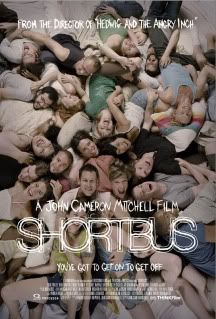
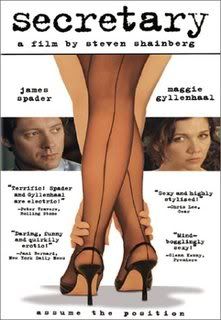
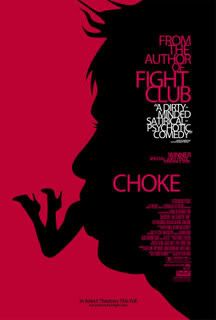
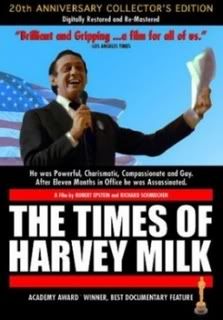 The Times of Harvey Milk (1984)
The Times of Harvey Milk (1984) Milk (2008)
Milk (2008)